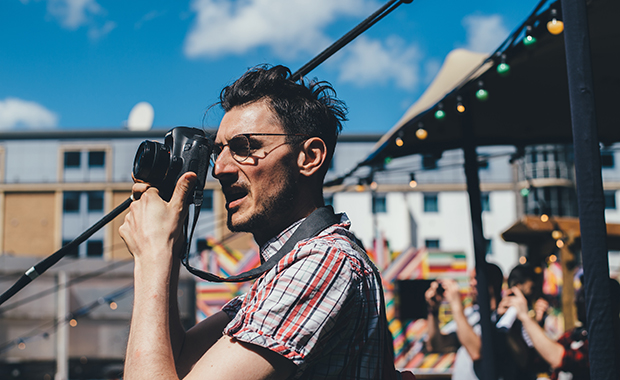Life
No Mess, No Clutter For 4 Weeks.

Today is a special anniversary. It’s been four weeks of no mess and no clutter. A few of my work colleagues were fascinated by this achievement when I told them and asked me to write about it.
The process to get there was grueling. It made me sick, it was stressful and it was hard. It was worth every second though and it can help everyone reading this.
Here’s what I learned:
The past no longer has to haunt me.
After two weeks, I realized that I had let go of the ex-girlfriends, failed startups and memories that held no significance in my life. Throwing out junk and decluttering helps you deal with the past.
You may think you have dealt with the past but the objects that are left over are the last remaining bits that must be dealt with.
There’s something so freeing about letting go and dealing with your past. It creates space for you to excel in the future and empty your mind. No longer will a dumb pair of socks that your ex-partner bought, remind you of the way they complained about you all the time.
I saved money and lots of it.
It’s only been four weeks and my bank account is thanking me for the tidy up. Now that I know what I have, I can stop buying more batteries, screwdrivers and stationary that I already have.
“Once you’ve lived without clutter, you become like a prison guard, guarding your home against possessions you’ll never use”
This results in fewer purchases and my debit card thanks me.
I was spending hundreds of dollars every year buying things that I might use on a rainy day in a few years. That rainy day came often, yet I never used the items I was stockpiling.
Thanks to these little changes, I now have more money to invest in stocks and my new startup.
You quit letting other people’s junk become your burden.
People die and leave you stuff.
People move countries and leave you stuff.
People ask you to look after their stuff.
People give you stuff that you’re too scared to throw out in case they find out and get upset with you.
You can’t keep letting other people’s possessions become your burden. Set yourself free and let go of possessions regardless of where they came from or who will care. It’s the only way to declutter.
It’s obvious what I can live without.
Now that more than 50% of my possessions are in either charity bins or at the recycling center, I now know what I can live without. Here’s what I was wrong about.
– I thought I needed coconut oil. It turns out that I hate the taste and haven’t used it for two years. Throwing it away reminded me that I could live without it.
– I thought I needed fifteen different pyjama tops. It turns out I only ever wear three of them. The other twelve pairs are not my size and remind me of my old body which I’m not proud of.
– I thought I needed tons of bedding and as it turns out, I rotate the same few doona covers and sheets because they have bright colors that make me happy. The black and grey ones are depressing and I subconsciously never choose to use them.
– I thought I needed to buy in bulk. It turns out I don’t have the room and it feels better to live in a decluttered environment. Buying in bulk was only making the retailers rich, and me sad.
I’m surrounded by objects that make me happy.
That’s the result of having no mess and decluttering. Items that you keep (only keep the stuff that brings you joy) are now all around you. Everywhere I now look, I see useful possessions that get used and make me happy.
Decluttering allowed me to have more of what I love, and less of what I don’t. Being happy is a decision.
“It takes lots of small decisions about what to throw out, to get to a point where your limited number of possessions can bring you joy”
I also know everything I have now because I have so few possessions. This makes me happy.
My life is now organized.
Being organized is a massive time saver. No longer do I need to go on the equivalent of a twelve day Easter Egg Hunt to find a belt I want to wear. It’s now either the black one or the brown one.
This feeling of being organized is addictive and if you do one big tidy up, and you don’t stop until its done, you’ll never go back to your messy ways.
Being organized equals time, which equals money baby!
P.S – Before you send me an email full of rage over how simple I make this all sound, try it for yourself. Take a risk. Embrace the fear. I’m not the only one who has decluttered. There are thousands of us on the Internet that you can look up who’ve had the exact same experience.
If you want to increase your productivity and learn some more valuable life hacks, then join my private mailing list on timdenning.net
Did You Know
How Skilled Migrants Are Building Successful Careers After Moving Countries
Behind every successful skilled migrant career is a mix of resilience, strategy, and navigating systems built for locals.

Moving to a new country for work is exciting, but it can also be unnerving. Skilled migrants leave behind familiar systems, networks, and support to pursue better job opportunities and a better future for their families. (more…)
Life
10 Research-Backed Steps to Create Real Change This New Year
This New Year could finally be the one where you break old patterns and create real, lasting change.

Every New Year, we make plans and set goals, but often repeat old patterns. (more…)
Life
9 Harsh Truths Every Young Man Must Face to Succeed in the Modern World
Before chasing success, every young man needs to face these 9 brutal realities shaping masculinity in the modern world.

Many young men today quietly battle depression, loneliness, and a sense of confusion about who they’re meant to be.
Some blame the lack of deep friendships or romantic relationships. Others feel lost in a digital world that often labels traditional masculinity as “toxic.”
But the truth is this: becoming a man in the modern age takes more than just surviving. It takes resilience, direction, and a willingness to grow even when no one’s watching.
Success doesn’t arrive by accident or luck. It’s built on discipline, sacrifice, and consistency.
Here are 9 harsh truths every young man should know if he wants to thrive, not just survive, in the digital age.
1. Never Use Your Illness as an Excuse
As Dr. Jordan B. Peterson often says, successful people don’t complain; they act.
Your illness, hardship, or struggle shouldn’t define your limits; it should define your motivation. Rest when you must, but always get back up and keep building your dreams. Motivation doesn’t appear magically. It comes after you take action.
Here are five key lessons I’ve learned from Dr. Peterson:
-
Learn to write clearly; clarity of thought makes you dangerous.
-
Read quality literature in your free time.
-
Nurture a strong relationship with your family.
-
Share your ideas publicly; your voice matters.
-
Become a “monster”, powerful, but disciplined enough to control it.
The best leaders and thinkers are grounded. They welcome criticism, adapt quickly, and keep moving forward no matter what.
2. You Can’t Please Everyone And That’s Okay
You don’t need a crowd of people to feel fulfilled. You need a few friends who genuinely accept you for who you are.
If your circle doesn’t bring out your best, it’s okay to walk away. Solitude can be a powerful teacher. It gives you space to understand what you truly want from life. Remember, successful men aren’t people-pleasers; they’re purpose-driven.
3. You Can Control the Process, Not the Outcome
Especially in creative work, writing, business, or content creation, you control effort, not results.
You might publish two articles a day, but you can’t dictate which one will go viral. Focus on mastery, not metrics. Many great writers toiled for years in obscurity before anyone noticed them. Rejection, criticism, and indifference are all part of the path.
The best creators focus on storytelling, not applause.
4. Rejection Is Never Personal
Rejection doesn’t mean you’re unworthy. It simply means your offer, idea, or timing didn’t align.
Every successful person has faced rejection repeatedly. What separates them is persistence and perspective. They see rejection as feedback, not failure. The faster you learn that truth, the faster you’ll grow.
5. Women Value Comfort and Security
Understanding women requires maturity and empathy.
Through books, lectures, and personal growth, I’ve learned that most women desire a man who is grounded, intelligent, confident, emotionally stable, and consistent. Some want humor, others intellect, but nearly all want to feel safe and supported.
Instead of chasing attention, work on self-improvement. Build competence and confidence, and the rest will follow naturally.
6. There’s No Such Thing as Failure, Only Lessons
A powerful lesson from Neuro-Linguistic Programming: failure only exists when you stop trying.
Every mistake brings data. Every setback builds wisdom. The most successful men aren’t fearless. They’ve simply learned to act despite fear.
Be proud of your scars. They’re proof you were brave enough to try.
7. Public Speaking Is an Art Form
Public speaking is one of the most valuable and underrated skills a man can master.
It’s not about perfection; it’s about connection. The best speakers tell stories, inspire confidence, and make people feel seen. They research deeply, speak honestly, and practice relentlessly.
If you can speak well, you can lead, sell, teach, and inspire. Start small, practice at work, in class, or even in front of a mirror, and watch your confidence skyrocket.
8. Teaching Is Leadership in Disguise
Great teachers are not just knowledgeable. They’re brave, compassionate, and disciplined.
Teaching forces you to articulate what you know, and in doing so, you master it at a deeper level. Whether you’re mentoring a peer, leading a team, or sharing insights online, teaching refines your purpose.
Lifelong learners become lifelong leaders.
9. Study Human Nature to Achieve Your Dreams
One of the toughest lessons to accept: most people are self-interested.
That’s not cynicism, it’s human nature. Understanding this helps you navigate relationships, business, and communication more effectively.
Everyone has a darker side, but successful people learn to channel theirs productively into discipline, creativity, and drive.
Psychology isn’t just theory; it’s a toolkit. Learn how people think, act, and decide, and you’ll know how to lead them, influence them, and even understand yourself better.
Final Thoughts
The digital age offers endless opportunities, but only to those who are willing to take responsibility, confront discomfort, and keep improving.
Becoming a man today means embracing the hard truths most avoid.
Because at the end of the day, success isn’t about luck. It’s about who you become when life tests you the most.
Change Your Mindset
The Four Types of Happiness: Which One Are You Living In?
Most people chase success only to find emptiness, this model reveals why true happiness lies somewhere else.

In a world driven by rapid technological growth and constant competition, many people unknowingly trade joy for achievement. (more…)
-

 News2 weeks ago
News2 weeks agoBrandon Willington Builds 7-Figure Business by Ignoring Almost Everything
-

 Health & Fitness2 weeks ago
Health & Fitness2 weeks agoWhat Minimalism Actually Means for Your Wellness Choices
-

 Did You Know2 weeks ago
Did You Know2 weeks agoWhy Most Online Courses Fail and How to Fix Them
-

 Business2 weeks ago
Business2 weeks agoIf Your Business Internet Keeps Letting You Down, Read This
-

 Business4 days ago
Business4 days agoEntrepreneur’s Guide to Pay Stubs: Why Freelancers and Small Business Owners Need a Smart Generator
-

 Business2 days ago
Business2 days agoThe Simple Security Stack Every Online Business Needs
-

 Finances3 days ago
Finances3 days agoWhy Financial Stress Is One of the Biggest Barriers to Personal Growth
-

 Scale Your Business2 days ago
Scale Your Business2 days ago5 Real Ways to Grow Your User Base Fast


























1 Comment